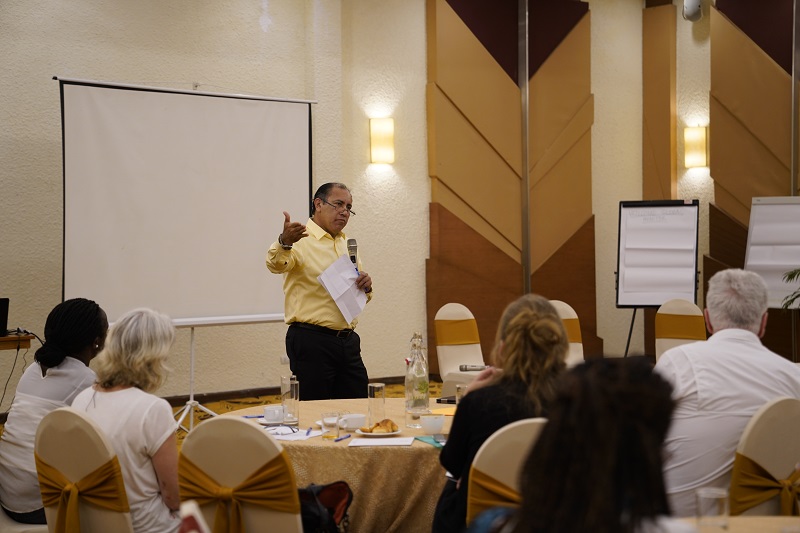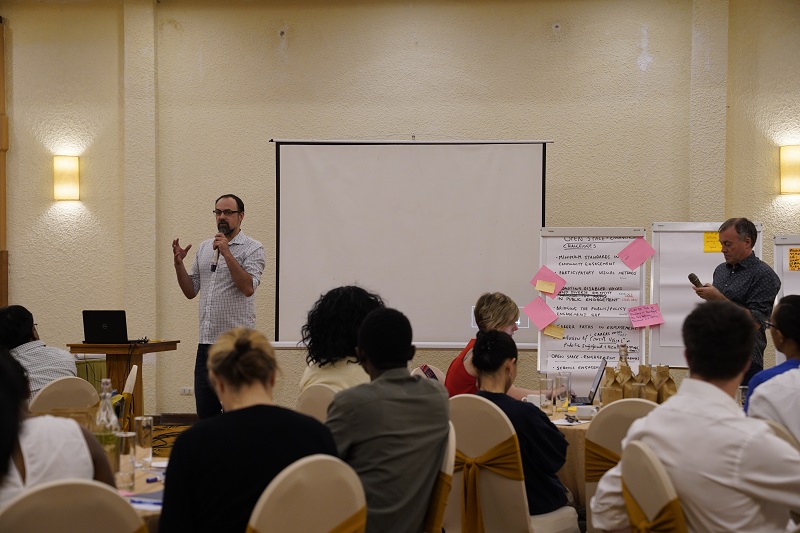Image: Rafael presenting at the workshop | Minh Tan
UNICEF Communication for Development (C4D) has long been a key player in embedding engagement in its work, which aims to realise the rights of every child, especially the most disadvantaged. Rafael Obregon, chief of UNICEF C4D, presented on the organisation’s work in this area at the 2018 Wellcome International Engagement Workshop. For UNICEF C4D, community and public engagement (CPE) is key in enabling communities to participate in humanitarian action, as well as for promoting healthy and protective behaviours. For this to be properly implemented, it was realised that a systems-strengthening approach needed to be taken; this takes into account the community networks that a child may come into contact with, such as social networks, education systems and justice systems. By strengthening the processes by which these organisations work, this can allow for strong, integrated system delivery by UNICEF.
When undergoing its strategy review and deciding to move towards this systems-based approach, of which community engagement is a key part, UNICEF C4D came up against a difficulty faced by many working in engagement: How can you define what ‘good’ engagement is? How do you define what success looks like for an engagement activity? Along with other charities, funders and non-governmental organisations, UNICEF C4D has therefore been working to solve this problem by developing a set of minimum standards and indicators for community engagement practitioners.
The project initially came from the context of the Ebola outbreak, where CPE did not begin to be coordinated until a year into the response, although the organisers acknowledge that the challenges in the CPE field have been around for a lot longer than that. These challenges include the lack of evaluation, lack of agreed methods and rules and the perception that engagement is ‘fuzzy’ or ‘soft’. Partners including Oxfam, the World Health Organisation, UNICEF and the Bill and Melinda Gates Foundation were convened to discuss developing a set of standard operating procedures and indicators to resolve some of these issues and help integrate CPE with policy and programmes.
Common principles that came up when scoping for the standards were participation/ownership, leadership, capacity and empowerment. The standards will be grouped according to level of desirability: minimum, intermediate and experienced.
Workshop participants discussed issues such as how the standards were developed and how they should be assessed and consulted on to make sure they are as relevant and applicable to as many people as possible.
Jamie Bedson, an author of the Minimum Standards document, presenting to workshop attendees | Minh Tan
The question of ethical standards in engagement also came up, which brings with it many issues: some engagement activities currently do not get ethical approval. If it was decided that they all should, then many non-academic organisations may struggle with the complex and time-consuming process of going through ethics approvals. How can we marry the importance of accessibility and community ownership with the need for stringent ethical guidelines?
Aside from this, participants stressed the importance of making sure the standards account for different budgets and capacities within different projects, as well as recognising that the standards may be different at project and program level.
For more information about the minimum standards process, click here. At the end of 2018, Mesh ran an online consultation on behalf of UNICEF to gain further insights on the draft standards. You can see the draft standards and subsequent discussion here.
---
The content on this page forms part of the online report for the 2018 International Engagement Workshop “Taking it to the Next Level: How can we generate leadership and develop practice in engagement?". To learn more about the workshop, access the rest of the report and browse the video presentations, discussion summaries, and tools, visit the workshop page.

This work is licensed under a Creative Commons Attribution 4.0 International License.



Please Sign in (or Register) to view further.